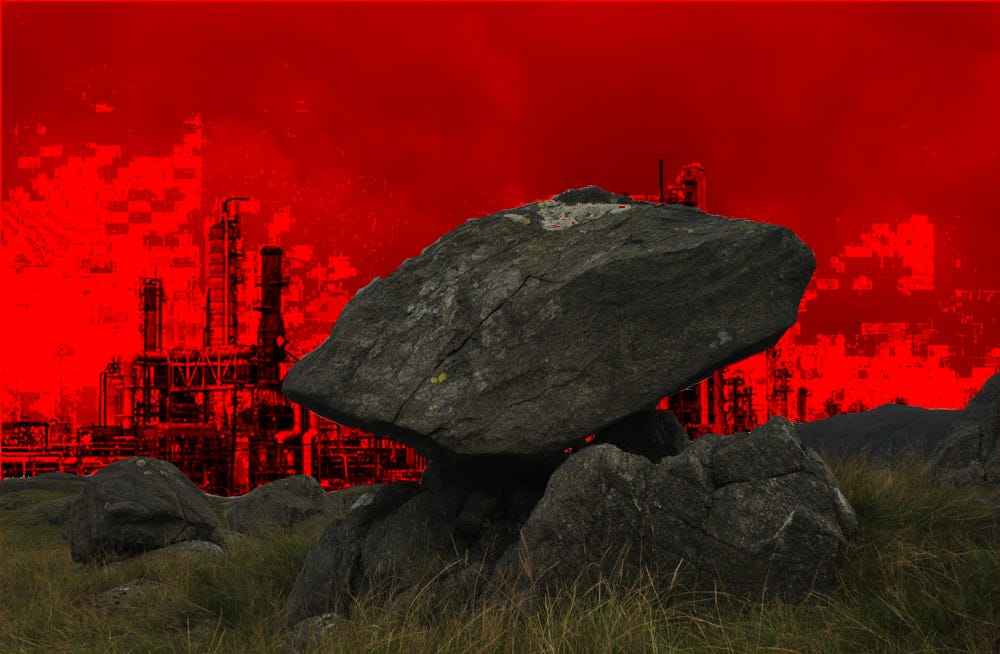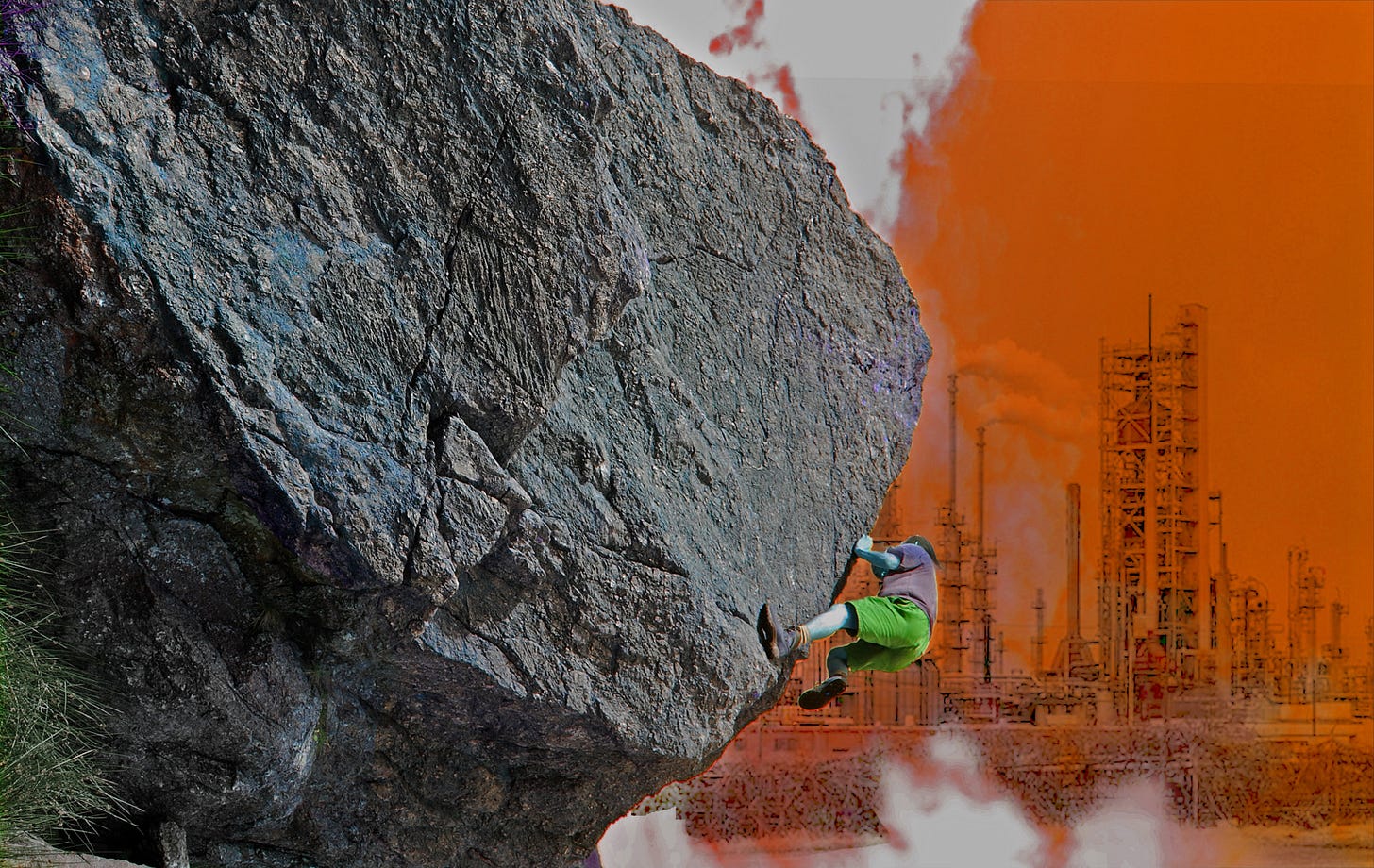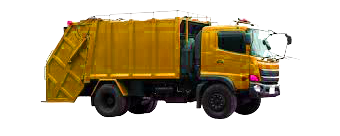A boulder and a boulderer
Brought out of the mountains by a glacier to become the only 17b boulder-climb in southern England [short story 1500 words 6 mins
“But once you’ve climbed this thing,” Marcus asks: “What then?”
Somewhere down by the incinerator, a dumptruck’s reversing. Through the cracked grey window, its orange light flickers across the plastic surfaces of the caravan.
The Leopard still doesn’t answer. After two full days of rest, the final days before the climb, the Leopard is nervous and irritable. She peers out into the dripping spaces of the abandoned quarry. The triangular, granite boulder floats like a ghost stone below the soot-blackened quarry walls.
The boulder. Belonging by rights on a crag top in the snow and rain, somewhere up in mid-Wales. But cracked off by frost ten thousand years ago, edged over the edge, rolled and bouncing down to the glacier. Down into the bergschrund it would be, dragged along the base of the ice, one edge of it ground smooth against the bedrock; turning over in an icefall, smoothed off again on a different facet at 30 degrees. And dropped off here, the grey ice melting away from it, grey icewater around its flanks and then dry, perched on a pile of glacier rubble, balanced on one of those 30-degree facets.
A year and a half she’s been working on it, working on the moves. And now, after two full days of rest, the final day of the climb, the Leopard is nervous and irritable. Marcus doesn’t ask his question again.
A truck pulls up. Too early – the camera crew aren’t due until mid-day. But it isn’t the camera crew, and Marcus stoops through the low doorway, closes it behind him with its usual tinny clunk, steps out to the muddy roadway and the crackle of the crushing plant.
It’s Marcus’s own truck, and Billy from the recycling centre driving it. “You’ve run it into something, Marcus. The back of it’s all scraped up.”
Marcus: his legs don’t work that well. He broke his legs on a trad climb, back when he was young. Which is why Marcus is even here: the Leopard wouldn’t share her life with anyone who was another climber.
“Do me a favour,” Marcus says to Billy. “Take it away, park it up with its back to a wall somewhere. Just until tomorrow.”
Billy looks up at the granite boulder, high against the quarry walls. “It’s today, isn’t it? Your Leopard woman, try and climb this thing?”
“She already worked out the moves, all the way up. It’s just linking them together.”
And after the Leopard’s climbed her boulder, and it’s time to move on – what then? Never mind the recycling job here, and the caravan parked up in the old quarry. There probably isn’t another unclimbed 17b in all of England.
Yellow smoke drifts above, burning plastic from the incinerator. Marcus doesn’t notice it now: a year and a half it’s been, while the Leopard works her project on the boulder.
And here it is, right on cue: the camera truck, ready to record the eight moves, the minute and a half of climbing it’ll take finally to achieve this eighteen-month project. Marcus feels the caravan move behind him, its weight shifting as the Leopard steps down to meet the camera crew.
The Leopard, with her feet no bigger than a child’s but those enormous hands, bigger than a man’s. Almost as if she wasn’t from this planet at all, brought here by some strange force to meet this granite boulder.
Nonsense, of course. Marcus has met her parents, for Heaven’s sake. Two ordinary trad climbers, working over at the composting facility – retired now, moved up the coast where the sport-climbing routes are. But the Leopard, big as she is, stands as if there was an invisible film between here and the mud-and-plastic roadway that’s all churned by the wheels of the bin lorries. And behind her, pale against the oil-stained walls of the quarry: the granite boulder. The boulder out of Wales dropped off by the retreating ice.
The video presenter’s a long-haired blond, all dressed up in green leggings and cut-off top, good climbing muscles on him. Camera person, small dark-skinned girl: she walks around the rock, looking up at the shapes of it.
“And what, after you’ve climbed this one,” the presenter’s asking. “First 17b in the South. What’s your next project?”
The Leopard just scowls at him, and Marcus interrupts. “We’ve cleaned it all up, made it look nice. Maybe get some footage, while the Leopard’s chalking it up?” The camera person approves of that, crouches under the boulder to get the Leopard up against the sky. The presenter glances at his notes, puts in his earpiece and starts off on his spiel.
The presenter doesn’t notice, but the Leopard’s having a bit of trouble with the ladder. She’s chalked up the holds a hundred times before – but now, she doesn’t quite seem to know how. To know just where to put the ladder.
She shifts it a few inches, kicks its feet into the mud, chalks up the holds at the top edge. Down below, the camera person’s using her and her ladder to make strange shapes against the sky.
The boulder stands like an anvil against the grey air, overhanging all four sides, not much more than two square metres of it actually in contact with the ground. Just the line of chalk marks, white handprints of a climb that hasn’t happened yet, that’s about to happen here. Up to the sharp edge of the stone, and above that the black-orange clouds drifting across from the incinerator.
The Leopard raises her left hand, places it on the second handhold. No nervousness now. A moment of perfect stillness, and then she’s moving. She springs, right hand goes to the third handhold, both feet up on the rockface, left hand back to the hold she missed out a moment ago, then left foot to the same place, left hand up and back behind her head.
Under the overhang of the boulder, where the two of them have cleaned down the rock for climbing, feldspar crystals the size of your thumb. Crystals from when the granite itself was forming deep under the mountains. Climbing doesn’t just show the true nature of the climber: sometimes it does the same for the rock as well.
Her body sways left: the Leopard’s a metre up now, and her left foot goes out, touches the rock and back again. Only Marcus notices that it wasn’t chalked, where that left foot just went, wasn’t a pre-set foothold at all. Because the Leopard sways back, and hangs for a moment, two metres up now, body almost horizontal under the overhang of the boulder. Again, there shouldn’t be that hesitation; arms tiring for an unnecessary second there, and her left hand jerks up and back, right foot powers up, pushing upwards and away. Her hand reaches upwards again, slaps against the underside of the rock. And she’s off.
For a long tenth of a second the Leopard hangs in the air; then drops backwards, her back curving for the impact as she hits the mat below, shoulders first, rolling; and dust puffs upwards out of the mat.
‘So that’s it.” The camera person straightens up.
Suddenly, the presenter’s in a hurry. There’s a championship climb down on the coast, still time to drive down there, get something out of the afternoon. Three minutes, and the two of them are back in the van, mud splattering as they reverse away and turn in the forecourt of the abattoir.
The Leopard’s still lying there on the mat, gazing up at the rock, the underside of the boulder. Frowning.
“Well,” she says. “Failed to climb the thing. Fancy that.”
“You climbed it,” Marcus says. “You climbed it two nights ago, after they turned on the sodium lights. I saw you out the window of the caravan.”
“And I saw the scratch marks on the back of your truck. It was you, wasn’t it?”
In the distance, the clank of the entrance gates: the camera crew, on their way out.
“Perched here on its pile of rubble from the glacier. Marcus, you moved it. Just a tiny bit, a few degrees. You moved it with your truck. Not enough to show, just enough to make the holds not work any more.”
Marcus doesn’t say anything.
“I should be angry. I should be bloody furious.”
“But you aren’t. You climbed it two nights ago. And there isn’t another 17b in all of southern England.”
“And now,” the Leopard says slowly. “And now there is.” She stands up: mud and plastic sticking to the back of her leggings, she isn’t going to care about that. Tilts her head sideways, places her hands on the first two holds. Reaches up with a toe. “Oh my word, might even be a 17c at that.”
The granite boulder, brought by the ice out of the Welsh mountains, pale like a ghost rock against the oil-stained quarry rocks.
“Marcus,” the Leopard said. “I think I love you…
“But what I’m wondering: how are we gonna pay for the damage to that truck?”
Most posts are about mountains, mountaineers and mountain literature, along with long-distance walkers. I publish a short story here every two or three months.






I love how that came together!